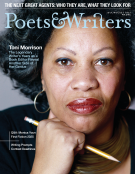I am a Trinidadian writer,” says Camille U. Adams, author of the memoir How to Be Unmothered: A Trinidadian Memoir (Restless Books, August 2025). “Not just a writer who was born and raised in Trinidad and Tobago and, thus, cites her birthplace in her bio. No. I am a writer who invokes the oral chantuelle tradition of my home. I am a writer who transcribes the unique idioms, is faithful to the grammatical structures, and channels the musical aurality embedded in our call-and-response narration when we enter storytelling mode.” This musicality infuses all of Adams’s prose, including her debut memoir, in which she narrates a childhood impacted by violence and abandonment. In reckoning with her family’s abusive dynamics, Adams also draws on the island nation’s colonial history, landscape, and storytelling traditions to create her own language of survival.

Camille U. Adams, author of the memoir How to Be Unmothered: A Trinidadian Memoir (Restless Books, August 2025).
Adams wrote How to Be Unmothered deliberately employing nonstandard spellings, which informed how she approached placing her excerpts in literary journals. “Telling the ugly truths of my family in beautiful poetic prose could never be undertaken authentically—I could never conduct what the reader feels and sees—if my work was being made subject to people pressuring me to pen my experiences in standard English, please,” says Adams. “Thus, I sought out literary magazines whose editors, I believed, would not interfere in the summoned release.” She found that with Sarah Starr Murphy, a managing editor of the Forge Literary Magazine, which ran an excerpt of Adams’s memoir. “With [Sarah] I experienced editing approached as a team,” says Adams. The online magazine, which was established by volunteers from an international online writers forum, publishes fiction or nonfiction every week with an awareness of the “wide range of English variants used internationally.” Submissions open at the beginning of every month (except September and December) until the magazine receives two hundred submissions; the editors charge a $3 fee per submission thereafter.
Within a month of receiving a portion of Adams’s memoir, the editors of Passages North accepted “Mas Does Start at Memorial Park” for publication in their annual print issue. Adams notes the magazine “takes such pride in championing inventive art that speaks directly to their readers’ hearts.” The journal, which is published by Northern Michigan University, features poetry, fiction, and nonfiction, including lyric essays, personal essays, memoir, and literary journalism. Matthew Gavin Frank, Passages North’s nonfiction/hybrids editor, writes: “We seek work that is pathologically curious.” He notes that the editors are also interested in hybrid work. “Send us your orphans, your bastards, your bumpings, and your grindings, whether whimsical, grave, or neither.” Submissions in all genres open September 1.
The rhythms, flora, and fauna of Trinidad recur throughout Adams’s memoir, often as a source of refuge from her family. Her work, then, was at home in the Common, which seeks to “deepen our individual and collective sense of place” through its publications, readings and literary events, and educational programs. In an interview with the Community of Literary Magazines and Presses, editor in chief Jennifer Acker says that a place “must be rendered sensorially” but also that it “must influence how people think or move, or interact, and the choices available to them.” The journal, which is edited at Amherst College, gathers poetry, fiction, and nonfiction in a print biannual and posts poetry, book coverage, nonfiction, or podcasts online every week. Submissions in all genres will open via Submittable with a $3 fee in September.
Adams praises the editors of both the Common and Hippocampus, pointing out that they “loved, supported, applauded, nominated, and were truly kind, diligent, organized, responsive, and lovely people that made all communication with them less work, more play.” Hippocampus published an excerpt of Adams’s memoir, “Why Deny the Obvious Child,” in 2023. The magazine, which is focused on “memorable creative nonfiction,” showcases memoir excerpts, essays, reviews, interviews, and craft articles in an online issue every two months. Creative nonfiction submissions to Hippocampus open via Submittable with a $3 fee on September 1. Submissions and pitches of book criticism, craft articles, and the like are accepted year-round via e-mail.
In 2022 the online literary quarterly Kweli featured a portion of Adams’s memoir, “Go Down in de Parlour, Said That Mother to Her Child.” Established in 2009, Kweli, which takes its name from the word for truth in Swahili, is devoted to encouraging emerging BIPOC writers to “sing the truth” through its journal as well as its workshops, retreats, festivals, and conferences. The magazine also hosts an annual fellowship program through which editors mentor at least three writers for a year, culminating in a piece published in Kweli. Writers such as Jeffery Renard Allen, Angie Cruz, Nathalie Handal, Victor LaValle, and Tiphanie Yanique have published work in the journal. Submissions in all genres open via Submittable on September 1.
Dana Isokawa is the editor in chief of the Margins and a contributing editor of Poets & Writers Magazine.








